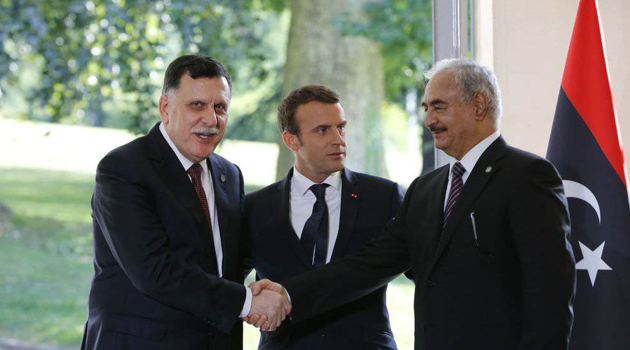In support of the action of the United Nations and in the framework of the implementation of the Skhirat Agreement, taking into account the initiatives of the international organizations working on Libya including the African Union, the European Union and the League of Arab States, and underlining the efforts made by Libya’s friend countries and partners in recent months, particularly Egypt, Algeria, the United Arab Emirates, Morocco, Tunisia and Italy.
The President of the French Republic, Emmanuel Macron, wished to contribute to resolving the Libyan crisis by inviting to La Celle Saint-Cloud on 25 July 2017 the Chairman of the Presidential Council of the Government of National Accord, Fayez Al Sarraj, and the commander of the Libyan National Army, Khalifa Haftar.
This initiative fully supports the role of the new Special Representative of the United Nations Secretary-General, Ghassan Salamé, who took part in the discussions on 25 July. France’s aim is to contribute to drawing up a political solution and helping the Libyans strengthen the Skhirat Libyan Political Agreement to make it more effective and inclusive.
The meeting in La Celle Saint-Cloud follows on from the meetings already held at various levels in Abu Dhabi, Cairo and Algeria, taking up their consensual elements. It aims to foster sustained and inclusive inter-Libyan dialogue in which all actors in good faith have a role to play.
In this context, the following declaration was adopted by the Libyan parties present:
“We, Fayez Al Sarraj, Chairman of the Presidential Council of Libya, and Khalifa Haftar, commander of the Libyan National Army, met in La Celle Saint-Cloud on 25 July 2017 at the invitation of the President of the French Republic and in the presence of Ghassan Salamé, Special Representative of the United Nations Secretary-General for Libya, in order to advance the cause of national reconciliation, and have agreed as follows:
- The solution to the Libya crisis can only be a political one and requires a national reconciliation process involving all Libyans, including the institutional, security and military actors who are prepared to participate peacefully, with the safe return of displaced persons and refugees and the creation of a transitional justice, reparation and national amnesty process as well as the implementation of Article 34 on security arrangements of the Libyan Political Agreement.
- We commit to a ceasefire and to refrain from any use of armed force for any purpose that does not strictly constitute counter-terrorism, in compliance with the Libyan Political Agreement and international treaties, and in order to protect Libya’s territory and sovereignty and we strongly condemn all that threatens the stability of the territory.
- We are committed to building the rule of law in a sovereign, civilian and democratic Libya that ensures the separation and peaceful transfer of powers and respect for human rights, and that has unified national institutions, such as the Central Bank of Libya, the National Oil Corporation and the Libyan Investment Authority. It should guarantee the safety of citizens, the integrity of the territory and the sovereignty of the State and the proper management of natural and financial resources in the interest of all Libyans.
- We are determined, supported by the impartial work of the Special Representative of the United Nations Secretary-General, to make effective the Libyan Political Agreement of 17 December 2015 and to continue political dialogue building on the Abu Dhabi meeting of 3 May 2017.
- We will make all efforts to support the consultations and work of the Special Representative of the United Nations Secretary-General, which need to be the subject of inclusive political dialogue in which the House of Representatives and the High Council of State will play their full role.
- We will continue our dialogue beyond La Celle Saint-Cloud meeting, pursuant to this declaration, and we commit to create conditions that are conducive to the work of the House of Representatives, the High Council of State and the High National Election Commission for the preparation of the upcoming elections.
- We will make all efforts to integrate fighters who so wish into the regular forces and call for the disarmament, demobilization and reintegration of the others into civilian life. The Libyan army will be made up of lawful military forces ensuring the defence of the Libyan territory in compliance with Article 33 of the Libyan Political Agreement.
- We have decided to work on establishing a roadmap for the security and defence of the Libyan territory against threats and trafficking of all types. We will work so that all security and military forces present adhere to this plan in the framework of the reunification of the military and security institutions in order to coordinate in the fight against terrorism, control migration flows through the Libyan territory, secure and control borders, and combat organized criminal networks that instrumentalize Libya and destabilize the Central Mediterranean.
- We solemnly commit to work towards the holding of presidential and parliamentary elections as soon as possible as from 25 July in cooperation with the relevant institutions and with the support and under the supervision of the United Nations.
- We ask the United Nations Security Council to support the guidelines of this declaration, and the Special Representative of the United Nations Secretary-General to engage in the necessary consultations with the different Libyan actors.”
(Source: French Ministry for Europe and Foreign Affairs)





